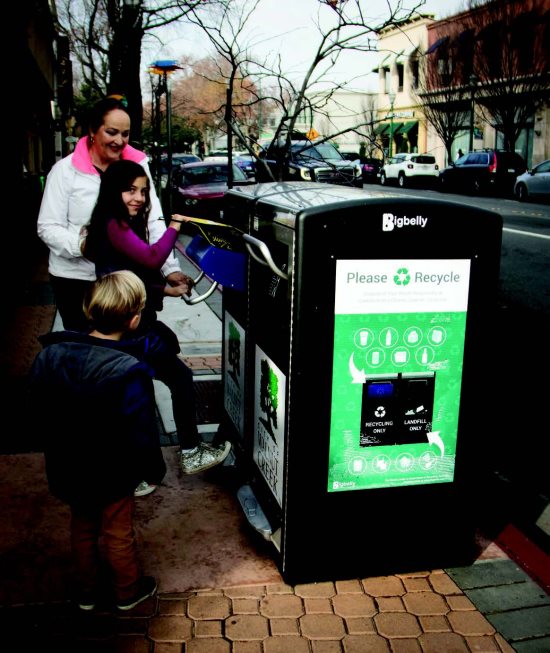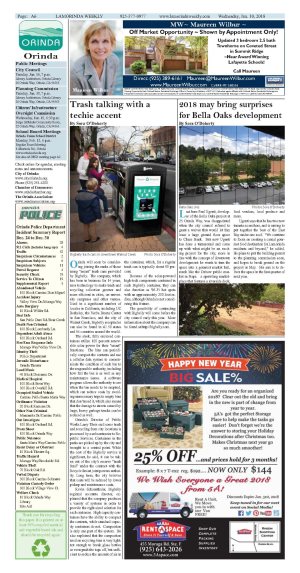| | Published January 10th, 2018
| Trash talking with a techie accent
| | | By Sora O'Doherty |  | | Bigbelly trash cans in downtown Walnut Creek Photo Sora O'Doherty |
Orinda will soon be considering joining the ranks of those using "smart" trash cans provided by Bigbelly. The company, which has been in business for 14 years, uses technology to make trash and recycling collection greener and more efficient in cities, on university campuses and other venues. Used in a significant number of locales in California, including UC Berkeley, the Yerba Buena Center in San Francisco, and the city of Walnut Creek, Bigbelly receptacles can also be found in all 50 states and 54 countries around the world.
 The sleek, fully enclosed containers utilize 100 percent renewable solar power for their "smart" functions. The bins can periodically compact the contents and use a cellular data system to communicate the condition of each bin to the responsible authority, including how full the bin is as well as any maintenance issues. A software program allows the authority to see when the bin needs to be emptied, which can reduce costs by avoiding unnecessary trips to empty bins that don't need it, which also means that the damage to streets caused by large, heavy garbage trucks can be reduced as well.
The sleek, fully enclosed containers utilize 100 percent renewable solar power for their "smart" functions. The bins can periodically compact the contents and use a cellular data system to communicate the condition of each bin to the responsible authority, including how full the bin is as well as any maintenance issues. A software program allows the authority to see when the bin needs to be emptied, which can reduce costs by avoiding unnecessary trips to empty bins that don't need it, which also means that the damage to streets caused by large, heavy garbage trucks can be reduced as well.
 Orinda's Director of Public Works Larry Theis said some trash and recycling from city locations is processed by a subcontractor to Republic Services. Containers in the parks are picked up by the city and brought to a central point. While the cost of the Bigbelly service is significant, he said, it can be taken out of the city's reserve "trash fund" under the contract with the Recycle Smart joint powers authority. Long term, the city believes that costs will be reduced by lower pickup and maintenance costs.
Orinda's Director of Public Works Larry Theis said some trash and recycling from city locations is processed by a subcontractor to Republic Services. Containers in the parks are picked up by the city and brought to a central point. While the cost of the Bigbelly service is significant, he said, it can be taken out of the city's reserve "trash fund" under the contract with the Recycle Smart joint powers authority. Long term, the city believes that costs will be reduced by lower pickup and maintenance costs.
 Kevin Schoenthaler, Bigbelly regional accounts director, explained that the company produces a variety of systems in order to provide the right sized solution for each customer. High capacity containers have the ability to compact the contents, while standard capacity containers do not. Compaction is only one part of the system. He also explained that the compaction used on recycling bins is very light: not enough to break glass bottles or even push the tops off, but sufficient to reduce the amount of air in the container, which, for a regular trash can is typically about 90 percent.
Kevin Schoenthaler, Bigbelly regional accounts director, explained that the company produces a variety of systems in order to provide the right sized solution for each customer. High capacity containers have the ability to compact the contents, while standard capacity containers do not. Compaction is only one part of the system. He also explained that the compaction used on recycling bins is very light: not enough to break glass bottles or even push the tops off, but sufficient to reduce the amount of air in the container, which, for a regular trash can is typically about 90 percent.
 Because of the solar-powered high-tech components contained in each Bigbelly container, they can also function as Wi-Fi hot spots with an approximately 200-foot radius, although Orinda is not considering this feature.
Because of the solar-powered high-tech components contained in each Bigbelly container, they can also function as Wi-Fi hot spots with an approximately 200-foot radius, although Orinda is not considering this feature.
 The possibility of contracting with Bigbelly will come before the city council early this year. More information about the company can be found at http://bigbelly.com.
The possibility of contracting with Bigbelly will come before the city council early this year. More information about the company can be found at http://bigbelly.com.

|
| | | | | | | | | | | | |



